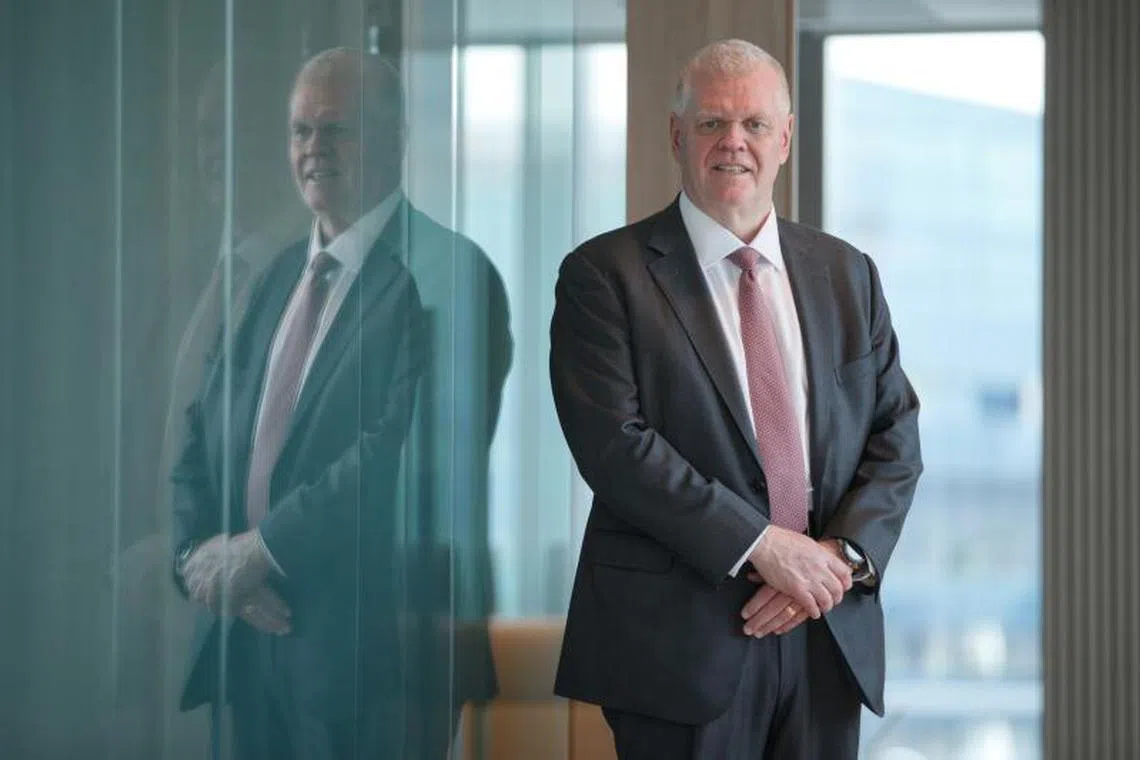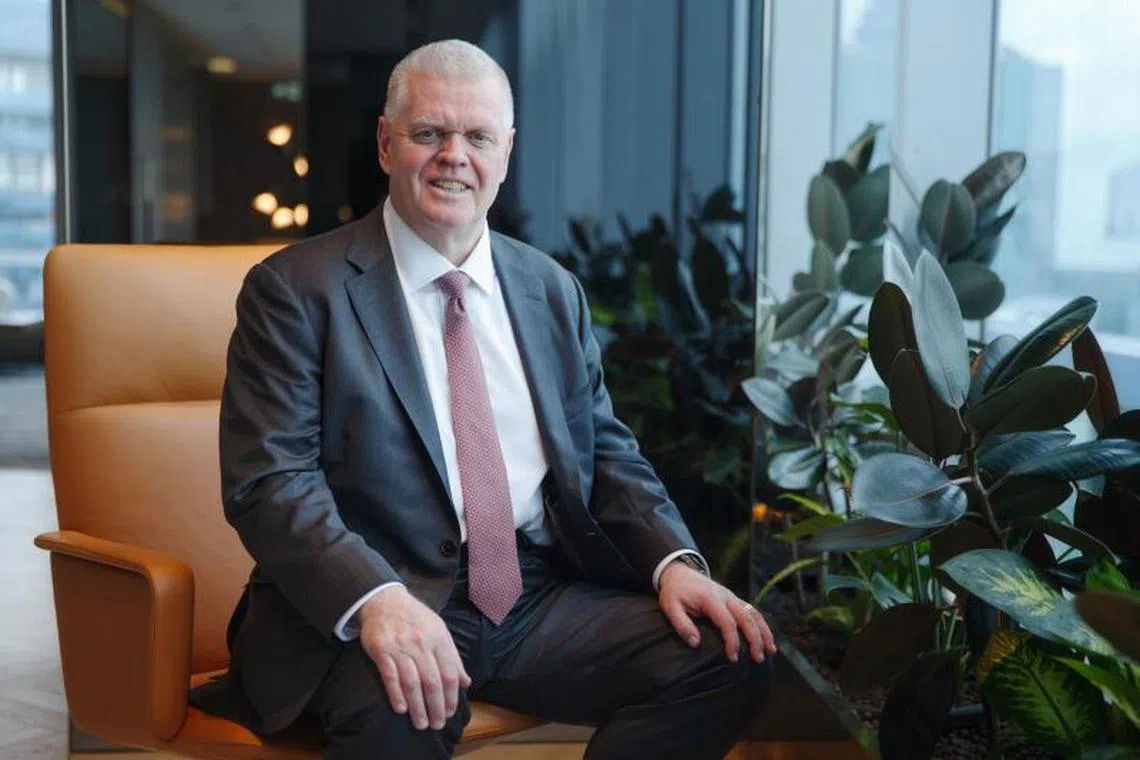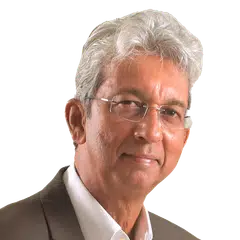S’pore a critical market for HSBC as it eyes growth backed by resurgent Asia: Group CEO
Sign up now: Get ST's newsletters delivered to your inbox

HSBC global CEO Noel Quinn said a strong regional presence in Asia is important for HSBC.
ST PHOTO: FELINE LIM
Follow topic:
SINGAPORE - HSBC Holdings’ global franchise remains strong and continues to grow steadily as its customers, especially in the Asia-Pacific, continue to expand their global networks.
Mr Noel Quinn, global chief executive officer of the bank, said its strategy of “remaining local while going global” with clients has seen its wholesale, retail and private banking franchise footprints spread via a network of offices in over 60 countries, with key retail hubs in Hong Kong, Britain and Mexico.
Mr Quinn, who was in town earlier this week to open HSBC’s new 140,000 sq ft Singapore headquarters
Europe’s biggest bank and the world’s seventh biggest by market capitalisation, which is headquartered in London, employs over 4,000 people in Singapore. HSBC has been here since 1877.
In an exclusive interview, Mr Quinn said a strong regional presence in Asia is important for the bank.
“We’ve committed to investing US$6 billion (S$8.2 billion) over the next few years in Asia. About 50 per cent of that will be in this region – in the Asean region, in India. Another 50 per cent of that will be in Hong Kong and China. US$3 billion of the investment is going into the market here in South and South-east Asia. Singapore is a critical market for us, and it’s critical for us in two principal areas – international corporates and international wealth.”
Mr Wong Kee Joo, HSBC Singapore’s chief executive officer, said that following its acquisition of insurance company AXA last year, HSBC Singapore is aggressively pursuing the mass affluent and high-net-worth markets here with a more complete suite of offerings.
“We are looking at capturing a sizeable amount of the $448 billion market in Singapore with improved product capability and reach,” he said.
He said the bank aims to double its wealth business by 2025 and push for double-digit growth in its commercial banking franchise in Singapore.
Mr Quinn, a 35-year veteran of the bank, dismissed the notion that HSBC is purely Asia-centric, given that over 70 per cent of its revenue was booked from the Asia-Pacific, especially North-east Asia.
“The P&L does not fully reflect our global presence and scale,” he said, referring to the profit and loss statement. “Take our German franchise, for example. Some 85 per cent of our clients’ business is in the Asia-Pacific, and especially China. So when I book US$1 in revenue in Germany from this client, I am also booking more than US$2 for this client in Asia. If you look at our wholesale clients, over 45 per cent of their revenue is booked overseas.”
He pointed out that some 75 per cent of HSBC’s revenue from the corporate bank is internationally connected.
“For every $1 booked here, some $3 or S$4 is booked in the Asean region, through our operations in those markets,” he said. ”Our relationship is local, but our support for clients is global.”
He added that the retail banking segment also fed HSBC’s wealth business in all its markets.
“Businessmen also need a bank to manage their personal wealth,” he said.
Still, analysts point out that the Covid-19 pandemic and subsequent lockdowns in North-east Asia as well as the US-China trade tensions had impacted some of the bank’s portfolios in these critical geographies in recent years.
But there are signs of an upturn.
The bank posted better-than-expected profit before tax of US$3.1 billion for the third quarter ended September 2022, although still down some US$2.3 billion from the same period a year ago.
Adjusted revenue was up US$3.1 billion from a year ago at US$14.3 billion. Of this, about US$6.3 billion came from its wealth and personal banking franchise.
It reported return on tangible equity (annualised) of 9.2 per cent for the first nine months of this year, but Mr Quinn expects this to rise to 12 per cent next year. The bank guided for a 50 per cent dividend payout for 2023 and 2024.
Still, over the past year, key shareholder and Chinese insurance giant Ping An has called for a break-up of the bank

Mr Quinn said HSBC had been among the earliest adopters of digital banking.
ST PHOTO: FELINE LIM
But Mr Quinn said this was not a feasible option.
“Having explored the proposal and sought independent advice, we have come to the conclusion that this is not in the best interest of the bank,” he said. “The strategy that we have now, following several years of business transformation, is the best for growth.”
As for China, he said that despite the challenges of the recent past, the Chinese market remains a critical element of HSBC’s business.
“This is an increasingly important consumption market. It is a strategically important market for HSBC, and we will continue to invest in it. China will emerge from Covid, and we remain committed and patient in this market, where we have had a presence for over 157 years.”
China accounted for almost US$1 billion of HSBC’s profit prior to Covid-19.
On the fintech front, Mr Quinn said HSBC was among the earliest adopters of digital banking.
“We digitalised our corporate treasury management 25-30 years ago, long before most of our competitors even got started,” he said. “HSBCnet, which has been the digital payment and treasury management platform for clients, is in its third-generation upgrade. Some 98 per cent of the US$660 trillion of payment are straight-through digitally processed.”
Mr Quinn said he was optimistic about HSBC’s resilience and growth prospects, after the bank came through the global pandemic and trade disruptions in good form and transformed its businesses over the past few years.


